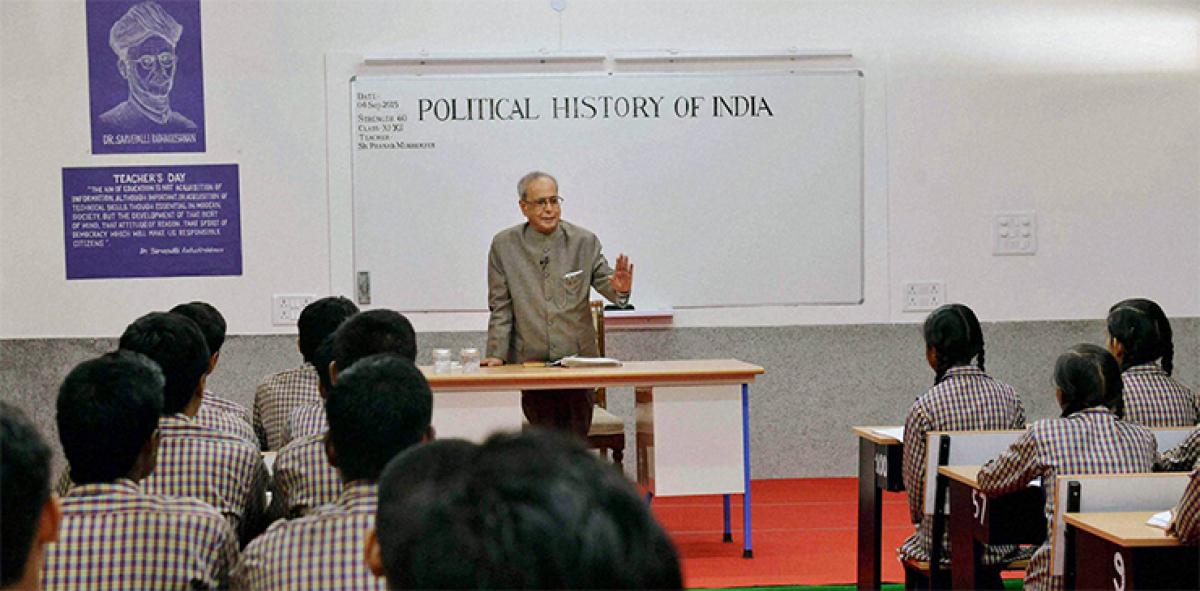Live
- BJP using Waqf issue as ‘political weapon’: K’taka Home Minister
- KSR Bengaluru and Kengeri Railway Stations get escalators
- Sunitha’s long cherished dream to become a reality soon!
- Sakra honours barefoot activist Ajay Oli, expands CSR initiatives to aid underprivileged
- Sudha Murty Celebrates Cultural Values At London's Diwali Gala, Praises Son-In-law Rishi Sunak
- PM Modi Arrives In Brazil For G20 Summit, Set For Key International Engagements
- The Little Book of Big Gains: How Technology Transforms Investing
- Only ineligible BPL cards cancelled, clarifies CM
- TTD EO administered oath as ex-officio member of Trust Board
- Five arrested for stealing old ballot boxes
Just In

It was an unique experience for 60 students at Dr Rajendra Prasad Sarvodaya Vidyalaya here when the first citizen of the country \"Mukherjee Sir\" today took a class on Political History, first ever by any President, spanning across incidents of his life to contemporary politics.
New Delhi: It was an unique experience for 60 students at Dr Rajendra Prasad Sarvodaya Vidyalaya here when the first citizen of the country "Mukherjee Sir" today took a class on Political History, first ever by any President, spanning across incidents of his life to contemporary politics.

Referred to as "wild idea" by Chief Minister Arvind Kejriwal to ask President Pranab Mukherjee to hold a class on the eve of Teachers' Day, the event generated enthusiasm among students who were eager avail unique opportunity to hear as teacher a career politician of over four decades who held three out of four crucial ministries on Raisina Hill.
79-year old Mukherjee, widely regarded for his command on history, donned the hat of teacher after 46 years as he entered the 'Lecture Hall', neatly divided in two rows with a red carpet, and immediately developed a connect with students eager to hear him. "If anyone of you feel little bored, you are free to tell me Mukherjee you can stop it. I am no longer a President or a Minister.
I am just your Mukherjee Sir...I will be happy if you call me Mukherjee Sir," said the jovial President when he felt the class was becoming too serious. Among these light hearted notes, were serious observations on the Political History of India when the President talked about the increasing role of social media and fourth pillar of the democracy--media and NGOs in forming social opinion which he said were "off shoot" of healthy democracy.
"Indian People are making experiments. They are not satisfied...They are asking is that all? Can't we do it better? Can't we achieve more? The powerful instruments that are developing as off shoots of this thinking are the civil society NGOs," the President said. Dressed in a formal grey bandgala, The President recalled that while he was abroad a foreign journalist had asked him about Anna Hazare movement which was demanding Jan Lokpal bill drafted by them to be implemented in the country.
"If the people feel that MPs are not doing their jobs, governments are not doing their jobs, the law which is required, they (people) cannot simply sit idle and they have no way to express their views. "Through media, and powerful medium -- the social media twitter, facebook. These are powerful mechanisms of conveying opinion, carrying opinion, creating public opinion.
All these are off shoots and outcome of our healthy democratic development and that is the contribution of Indian democratic system," the President said. Mukherjee said, "Many amendments have been made in the Constitution. Three important organs -- judiciary, executive and legislature and fourth organ I am talking of civil society, including media, NGO and powerful public opinions which are being created.
So how to run these systems smoothly?" "Change is constant. Change is virtual democracy," he said as he quoted line from Robert Browning's epic poem 'The Patriot' which the protagonist says when he goes to gallows, "Thus I entered, and thus I go!".The protagonist of the poem was loved when he rose through ranks but people abused him and send him to gallows for misdemeanour, he said. "That is essential part of the democracy. But we shall have to keep system moving on. If we can.
If we can for maintaining the balance," he said. During the hour long class, Mukherjee touched upon various facets of political history including the changes in the Economy under the then Prime Minister Narsimha Rao, Finance Minister Manmohan Singh, the entitlement of employment given through MNREGA by the UPA Government, growth of India from a food importer to food exporter, phenomenal growth in production of steel, cement and electricity and history of the Constitution drafting.

© 2024 Hyderabad Media House Limited/The Hans India. All rights reserved. Powered by hocalwire.com







